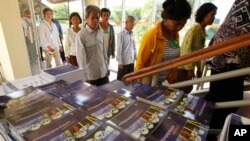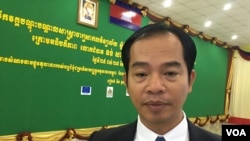The leading Khmer Rouge documentation center in Cambodia has partnered with the Ministry of Education, Youth and Sport, European Union, and USAID to hold a training course for more than 3,000 educators from around the country.
Vanthann Peoudara, deputy director of the Documentation Center of Cambodia (DC-Cam) said the training was part of broad compensation efforts ordered by the Khmer Rouge tribunal.
He said the training would improve the university staff’s ability to teach Cambodian history with an emphasis on healing the trauma of the past.
“The study can help them heal mentally and could possibly prevent crime, violence or genocide happening again in the future,” he said.
Chea Vanny, a university professor, said the training sessions had strengthened participants’ understanding of the period of Khmer Rouge rule. “In the training, the professors gain a better grounding in history to educate their students, especially the tragic history of the Khmer Rouge regime,” she said.
The Extraordinary Chambers in the Courts of Cambodia (ECCC), commonly known as the Khmer Rouge tribunal, was formed in 2006 and has both an international and local sides. While collective reparations have been ordered by the court, civil parties have also requested direct compensation for crimes they suffered.
Neth Pheaktra, ECCC spokesman, said that since there were “millions of victims” of the regime, the court had agreed that only collective reparations made sense.








